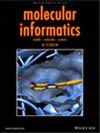Extended Activity Cliffs-Driven Approaches on Data Splitting for the Study of Bioactivity Machine Learning Predictions.
IF 3.1
4区 医学
Q3 CHEMISTRY, MEDICINAL
引用次数: 0
Abstract
The presence of Activity Cliffs (ACs) has been known to represent a challenge for QSAR modeling. With its high data dependency, Machine Learning QSAR models will be directly influenced by the activity landscape. We propose several extended similarity and extended SALI methods to study the implications of ACs distribution on the training and test sets on the model's errors. Ununiform ACs and chemical space distribution tend to lead to worse models than the proposed uniform methods. ML modeling on AC-rich sets needs to be analyzed case-by-case. Proposed methods can be used as a tool to study the datasets, but as far as generalization, random splitting was the better-performing data splitting alternative overall.
用于生物活性机器学习预测研究的数据分割扩展活动峭壁驱动方法。
众所周知,活性悬崖(AC)的存在对 QSAR 建模是一个挑战。由于高度依赖数据,机器学习 QSAR 模型将直接受到活动景观的影响。我们提出了几种扩展相似性和扩展 SALI 方法,以研究训练集和测试集上的 ACs 分布对模型误差的影响。与所提出的统一方法相比,不统一的 ACs 和化学空间分布往往会导致更差的模型。在富AC集上的 ML 建模需要逐个分析。建议的方法可作为研究数据集的工具,但就泛化而言,随机拆分是总体表现更好的数据拆分替代方法。
本文章由计算机程序翻译,如有差异,请以英文原文为准。
求助全文
约1分钟内获得全文
求助全文
来源期刊

Molecular Informatics
CHEMISTRY, MEDICINAL-MATHEMATICAL & COMPUTATIONAL BIOLOGY
CiteScore
7.30
自引率
2.80%
发文量
70
审稿时长
3 months
期刊介绍:
Molecular Informatics is a peer-reviewed, international forum for publication of high-quality, interdisciplinary research on all molecular aspects of bio/cheminformatics and computer-assisted molecular design. Molecular Informatics succeeded QSAR & Combinatorial Science in 2010.
Molecular Informatics presents methodological innovations that will lead to a deeper understanding of ligand-receptor interactions, macromolecular complexes, molecular networks, design concepts and processes that demonstrate how ideas and design concepts lead to molecules with a desired structure or function, preferably including experimental validation.
The journal''s scope includes but is not limited to the fields of drug discovery and chemical biology, protein and nucleic acid engineering and design, the design of nanomolecular structures, strategies for modeling of macromolecular assemblies, molecular networks and systems, pharmaco- and chemogenomics, computer-assisted screening strategies, as well as novel technologies for the de novo design of biologically active molecules. As a unique feature Molecular Informatics publishes so-called "Methods Corner" review-type articles which feature important technological concepts and advances within the scope of the journal.
 求助内容:
求助内容: 应助结果提醒方式:
应助结果提醒方式:


